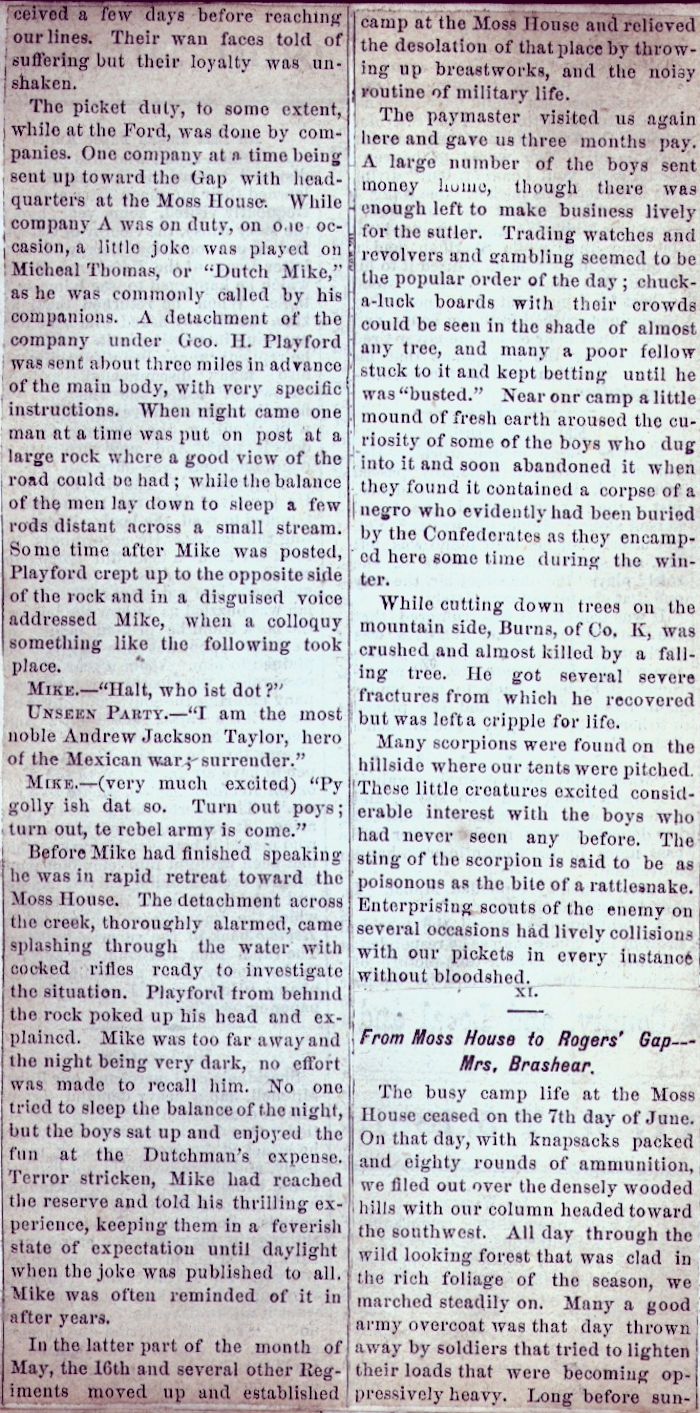| Camp & Field Page 17 | Camp & Field Index Page | 16th OVI Home Page | Camp & Field Page 19 |
The Camp & FieldArticles by Theodore Wolbach |
 Cpl. Theodore D. Wolbach |
The following image is taken from a book titled "Mortality and Statistics of the Census of 1850" in which it is believed retired Captain Rezin H. Vorhes, Company H, pasted over the pages a series of articles written by Cpl. Theodore D. Wolbach, Company E, titled "Camp and Field" and published, by chapter, in the Holmes County (Ohio) Republican newspaper from February 24, 1881 to August 17, 1882. The articles tell the story, in great detail and color, of the 16th OVI, from the inception of the 3-year regiment in October, 1861, through all its camps, battles and marches until it was disbanded on October 31, 1864. The articles pasted in the Vorhes book cover the first 35 chapters, published through October 20, 1881. All the remaining chapters were recently found in a Holmes County library by researcher Rob Garber who obtained copies, performed the transcriptions and provided to this website and which are also presented here, thus providing the complete work by Theodore Wolbach.
Throughout these articles click on the underlined white text for additional details.
The webauthor thanks 16th Ohio descendant Rob Garber for his excellent research on the Camp And Field articles and for performing the tedious digital transcription of those articles found on each page. The transcriptions were made to reflect the original articles verbatim, misspellings and all. Rob is the 3rd great nephew of Capt. William Buchanan, Company F, 16th Ohio, who served in the 90-day regiment as a private, re-enlisting in the three year regiment, and eventually making the rank of Captain of Company F. Thanks Rob!
Page 18 - Chapter 10, 11 - May/June, 1862
 |
ceived a few days before reaching our lines. Their wan faces told of suffering but their loyalty was unshaken. The picket duty, to some extent, while at the Ford, was done by companies. One company at a time being sent up toward the Gap with headquarters at the Moss House. While company A was on duty, on one occasion, a little joke was played on Micheal Thomas, or MIKE.-- UNSEEN PARTY.-- MIKE.-- (very much excited) Before Mike had finished speaking he was in rapid retreat toward the Moss House. The detachment across the creek, thoroughly alarmed, came splashing through the water with cocked rifles ready to investigate the situation. Playford from behind the rock poked up his head and explained. Mike was too far away and the night being very dark, no effort was made to recall him. No one tried to sleep the balance of the night, but the boys sat up and enjoyed the fun at the Dutchman's expense. Terror stricken, Mike had reached the reserve and told his thrilling experience, keeping them in a feverish state of expectation until daylight when the joke was published to all. Mike was often reminded of it in after years. In the latter part of the month of May, the 16th and several other Regiments moved up and established |
camp at the Moss House and relieved the desolation of that place by throwing up breastworks, and the noisy routine of military life. The paymaster visited us again here and gave us three months pay. A large number of the boys sent money home, though there was enough left to make business lively for the sutler. Trading watches and revolvers and gambling seemed to be the popular order of the day; chuck-a-luck boards with their crowds could be seen in the shade of almost any tree, and many a poor fellow stuck to it and kept betting until he was While cutting down trees on the mountain side, Burns, of Co. K, was crushed and almost killed by a falling tree. He got several severe fractures from which he recovered but was left a cripple for life. Many scorpions were found on the hillside where our tents were pitched. These little creatures excited considerable interest with the boys who had never seen any before. The sting of the scorpion is said to be as poisonous as the bite of a rattlesnake. Enterprising scouts of the enemy on several occasions had lively collisions with our pickets in every instance without bloodshed. Published in Holmes County Republican XI. From Moss House to Rogers' Gap--Mrs. Brashear. The busy camp life at the Moss House ceased on the 7th day of June. On that day, with knapsacks packed and eighty rounds of ammunition, we filed out over the densely wooded hills with our column headed toward the southwest. All day through the wild looking forest that was clad in the rich foliage of the season, we marched steadily on. Many a good army overcoat was that day thrown away by soldiers that tried to lighten their loads that were becoming oppressively heavy. Long before sun- |
| Camp & Field Page 17 | Camp & Field Index Page | 16th OVI Home Page | Camp & Field Page 19 |